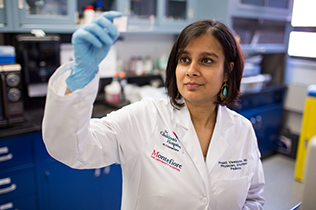
Whether at the bench or bedside, our physicians are always seeking innovative solutions to some of gastroenterology’s most pressing problems. We are currently conducting research in areas such as inflammatory bowel disease, intestinal failure, liver transplantation, cellular therapy for liver failure, and nonalcoholic fatty liver disease, among many others. Our expanding group of physicians also participates in myriad national consortiums and collaborative research studies. As a patient, not only will you have access to the many nationally- and internationally-recognized experts within our division, you will also be able to participate in and benefit from the groundbreaking research being conducting here at CHAM.
Identify Novel Therapies for Intestinal Failure
Dr. Thompson’s primary research interest is in improving the lives and outcomes of children with intestinal failure and short bowel syndrome. He has active IRB approved studies in this area. One study analyses the results of growth, nutritional parameters and liver function in the children followed in the intestinal rehabilitation program at CHAM. Dr Thompson is also the Principal Investigator in a multi-centered international study entitled A 12-Week Pharmacokinetic, Safety, and Pharmacodynamic Study of Teduglutide in Pediatric Subjects Aged 1 Year through 17 Years, with Short Bowel Syndrome who are Dependent on Parenteral Support
Improve Outcomes for Patients with Crohn’s Disease and Ulcerative Colitis
Using the Model Care Guideline from the Improve Care Now Network, we have assessed performance and identified gaps in care for children and adolescents with Crohn’s Disease and Ulcerative Colitis, successfully increasing our patients’ remission rate to 76 percent from 59 percent. Prednisone-free remission increased to 71 percent from 38 percent and the percentage of our patients with a documented visit within 200 days increased to 82 percent from 50 percent.
Develop Noninvasive Tests for Pediatric Nonalcoholic Fatty Liver Disease
We are working to identify noninvasive diagnostic tests for nonalcoholic fatty liver disease (NAFLD), which now affects approximately 10 percent of children in the United States. From a retrospective study, we found that a diagnosis of exclusion offers few answers – despite extensive testing – while a definitive diagnosis requires a liver biopsy with morbidity risk. For a prospective study, we’re combining diagnostic data from serum biomarkers, clinical parameters and innovative imaging tests based on elastography. Aided by this unprecedented analysis, better epidemiological algorithms may help doctors identify NAFLD and prevent its progression to cirrhosis.
Understanding Acute Liver Failure
Acute liver failure- the liver is an organ known for its tremendous potential to regenerate, making it possible for a living relative to donate a portion of his or her liver for transplantation and live normally. Dr. Viswanathan’s research is focused on trying to understand how liver cells get damaged in acute liver failure and why the liver is unable to regenerate after damage in certain instances, for example after drug toxicity. By understanding the underlying problem, we hope to reduce the need for transplantation for people with irreversible liver damage who then have to wait for a suitable organ.
We are also looking into why different people respond differently to liver injury, and why some people recover while others progress to more serious disease. Small molecules called microRNA are responsible for regulating various processes in the body, including response to injury. This gives us an opportunity to predict early on, the patients at risk for more serious liver damage so that we can tailor treatment more accurately.
Some patients with liver diseases will require a liver transplantation, but unfortunately many spend a very long time on the waiting list during which time they may become more ill. We are investigating whether we can transplant a few liver cells instead and see how these may improve outcome in liver disease. This approach could help some patients recover without a need for whole liver transplant.